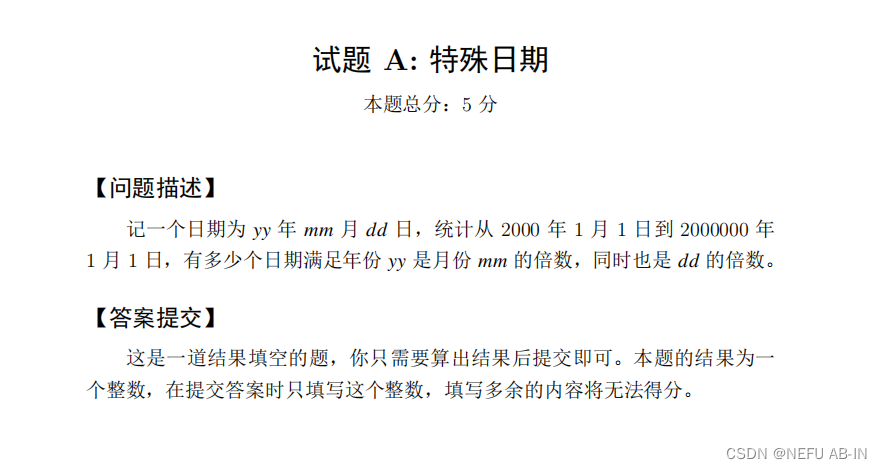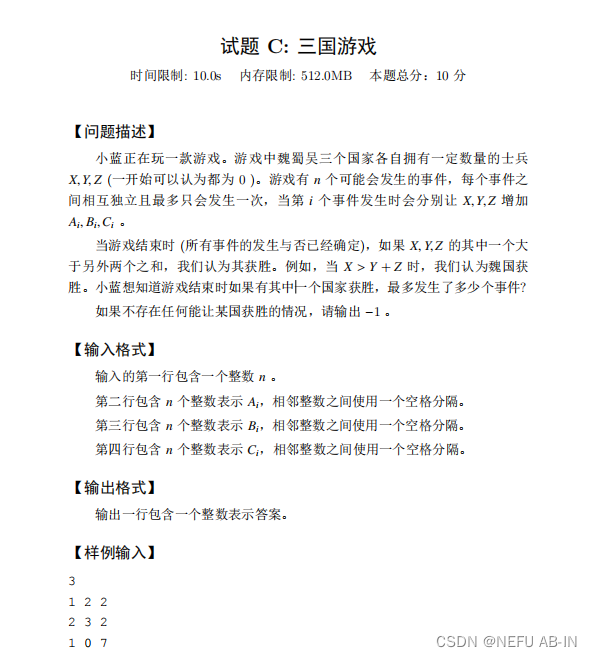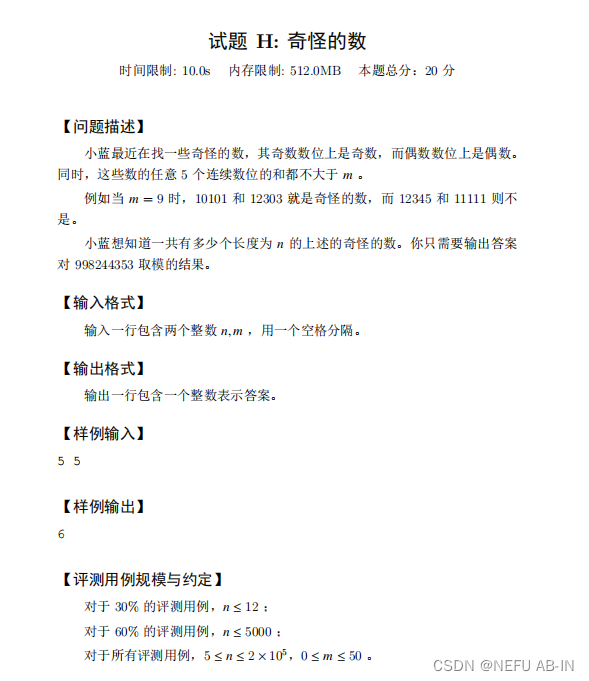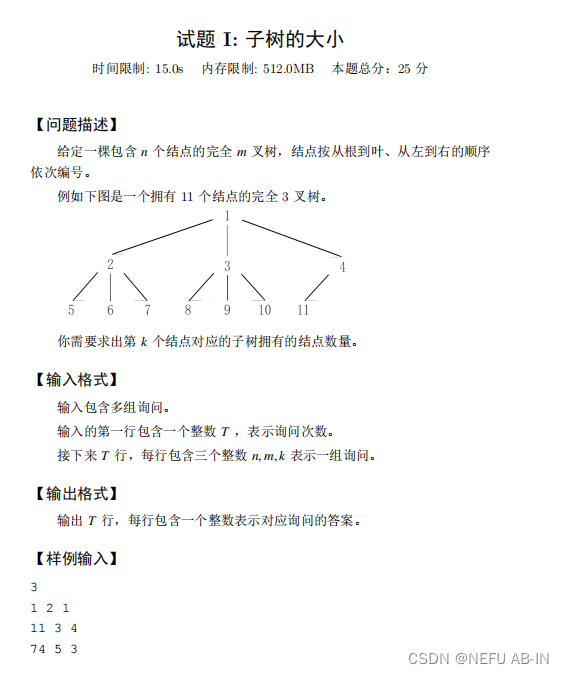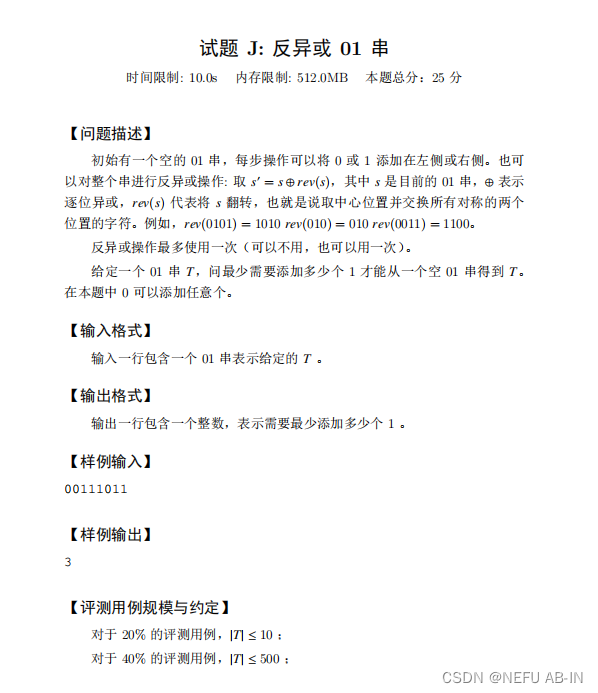第十四届蓝桥杯大赛软件组省赛 Python大学A组 个人暴力题解
摘要
Title: 第十四届蓝桥杯大赛软件组省赛 Python大学A组 个人暴力题解
Tag: A, B, C, D, E, F, G, H, I, J
Powered by:NEFU AB-IN
- 试题 A: 特殊日期
- 试题 B: 分糖果
- 试题 C: 三国游戏
- 试题 D: 平均
- 试题 E: 翻转
- 试题 F: 子矩阵
- 试题 G: 阶乘的和
- 试题 H: 奇怪的数
- 试题 I: 子树的大小
- 试题 J: 反异或 01 串
博主个人的暴力题解,基本很少是正解,求轻喷
省赛 Python大学A组 个人暴力题解
模拟即可,本身想用Python自带的datetime库,结果发现年不能开那么大,就直接手写了
1 | ''' |
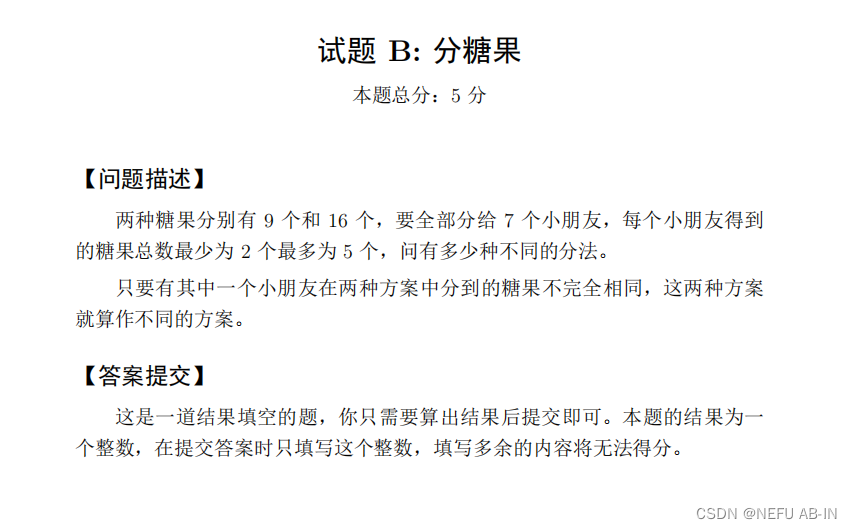
DFS爆搜即可
1 | # AB-IN AK Lanqiao !! |
-
试题 C: 三国游戏

-
思路
直接没思路,一看到数据范围瞬间怂了,脑子里想的只有暴力,这个题是留到最后写的,就写了个最差的二进制枚举
-
代码
1
2
3
4
5
6
7
8
9
10
11
12
13
14
15
16
17
18
19
20
21
22
23
24
25
26
27
28
29
30
31
32
33
34
35
36
37
38
39
40
41
42# AB-IN AK Lanqiao !!
import sys, math
from collections import Counter, deque, defaultdict
from bisect import bisect_left, bisect_right
from heapq import heappop, heappush, heapify
from typing import *
from datetime import datetime, timedelta
N = int(1e6 + 10)
INF = int(2e9)
sys.setrecursionlimit(INF)
read = lambda : map(int, input().split())
class sa:
def __init__(self, x, y):
self.x = x
self.y = y
def __lt__(self, x):
pass
# ---------------divrsion line ----------------
# 最差方法 二进制枚举
n, = read()
a = list(read())
b = list(read())
c = list(read())
ans = 0
for i in range(1 << n):
A, B, C, cnt = 0, 0, 0, 0
for j in range(n):
if i & 1 << j:
A += a[j]
B += b[j]
C += c[j]
cnt += 1
if A > B + C or B > A + C or C > A + B:
ans = max(ans, cnt)
print(ans if ans != 0 else -1)
-
-
试题 D: 平均
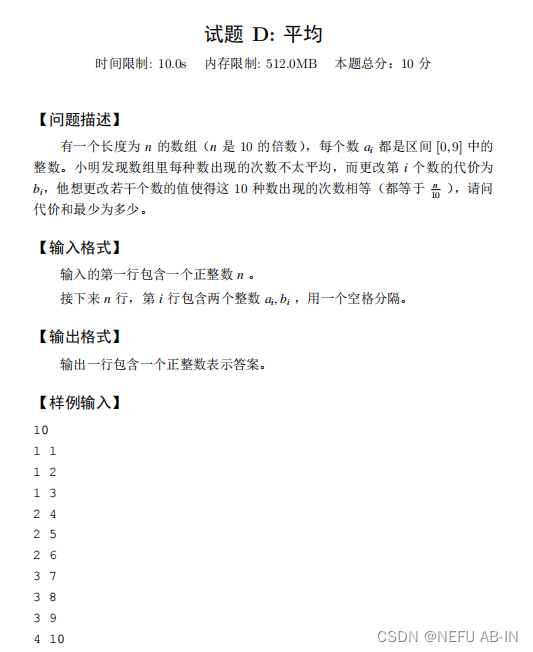
-
思路
唯一一个觉得暴力是正解的题
就是每个数最多就是n//10个,所以就去掉多的数,然后是那些数中代价小的,最后采用了前缀和优化了一下 -
代码
1
2
3
4
5
6
7
8
9
10
11
12
13
14
15
16
17
18
19
20
21
22
23
24
25
26
27
28
29
30
31
32
33
34
35
36
37
38
39
40
41
42
43
44
45
46
47
48
49# AB-IN AK Lanqiao !!
import sys, math
from collections import Counter, deque, defaultdict
from bisect import bisect_left, bisect_right
from heapq import heappop, heappush, heapify
from typing import *
from datetime import datetime, timedelta
N = int(1e6 + 10)
INF = int(2e9)
sys.setrecursionlimit(INF)
read = lambda : map(int, input().split())
class sa:
def __init__(self, a, b):
self.a = a
self.b = b
def __lt__(self, t):
if self.a != t.a:
return self.a < t.a
return self.b < t.b
# ---------------divrsion line ----------------
n, = read()
lst = [[] for _ in range(10)]
for i in range(n):
a, b = read()
lst[a].append(b)
for i in range(10):
lst[i].sort()
lst[i] = [0, *lst[i]]
# 前缀和
for j in range(1, len(lst[i])):
lst[i][j] += lst[i][j - 1]
# 保留的个数
k = n // 10
ans = 0
for i in range(10):
l = len(lst[i]) - 1
if l > k:
ans += (lst[i][l - k])
print(ans) -
试题 E: 翻转
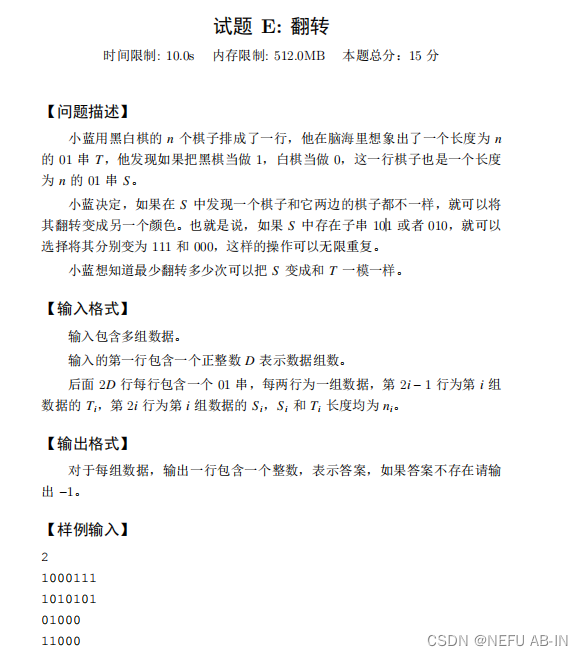
-
思路
BFS暴力,不会剪枝,剪枝想了一种,但是没有证明正确性,所以就没有采用
-
代码
1
2
3
4
5
6
7
8
9
10
11
12
13
14
15
16
17
18
19
20
21
22
23
24
25
26
27
28
29
30
31
32
33
34
35
36
37
38
39
40
41
42
43
44
45
46
47
48
49
50
51
52
53
54
55
56
57
58# AB-IN AK Lanqiao !!
import sys, math
from collections import Counter, deque, defaultdict
from bisect import bisect_left, bisect_right
from heapq import heappop, heappush, heapify
from typing import *
from datetime import datetime, timedelta
N = int(1e6 + 10)
INF = int(2e9)
sys.setrecursionlimit(INF)
read = lambda : map(int, input().split())
class sa:
def __init__(self, s, step):
self.s = s
self.step = step
def __lt__(self, x):
pass
# ---------------divrsion line ----------------
# BFS暴力 不会剪枝 没证明剪枝一定正确
def solve():
t = input()
s = input()
t = " " + t
s = " " + s
if t[1] != s[1] or t[-1] != s[-1]:
return -1
q = deque()
q.appendleft(sa(s, 0))
while len(q):
tp = q.pop()
s, step = tp.s, tp.step
if s == t:
return step
for i in range(2, len(s) - 1):
if s[i] == '0' and s[i - 1] == '1' and s[i + 1] == '1':
g = s[:i - 1] + "111" + s[i + 2:]
if g == t:
return step + 1
q.appendleft(sa(g, step + 1))
if s[i] == '1' and s[i - 1] == '0' and s[i + 1] == '0':
g = s[:i - 1] + "000" + s[i + 2:]
if g == t:
return step + 1
q.appendleft(sa(g, step + 1))
return -1
T, = read()
for _ in range(T):
print(solve()) -
试题 F: 子矩阵
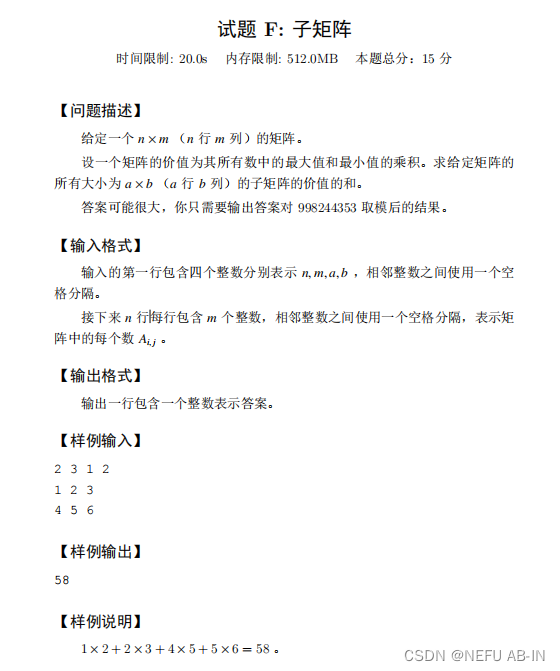
-
思路
这版是直接暴力做的
考试最后写了一点线段树优化,只不过只维护了行和列的最小值和最大值,但感觉Python写的线段树也优化不了多少 -
代码
1
2
3
4
5
6
7
8
9
10
11
12
13
14
15
16
17
18
19
20
21
22
23
24
25
26
27
28
29
30
31
32
33
34
35
36
37
38
39
40
41
42
43
44
45
46
47
48
49# AB-IN AK Lanqiao !!
import sys, math
from collections import Counter, deque, defaultdict
from bisect import bisect_left, bisect_right
from heapq import heappop, heappush, heapify
from typing import *
from datetime import datetime, timedelta
N = int(1e3 + 10)
MOD = 998244353
INF = int(2e9)
sys.setrecursionlimit(INF)
read = lambda : map(int, input().split())
class sa:
def __init__(self, x, y):
self.x = x
self.y = y
def __lt__(self, x):
pass
# ---------------divrsion line ----------------
# RMQ 问题 可写ST表 但我忘了...
# 暴力!
g = [[0] * N for _ in range(N)]
n, m, a, b = read()
def func(t1, t2):
mn, mx = INF, 0
for i in range(t1.x, t2.x + 1):
for j in range(t1.y, t2.y + 1):
mn = min(mn, g[i][j])
mx = max(mx, g[i][j])
return mx * mn % MOD
for i in range(1, n + 1):
g[i][1:] = read()
ans = 0
for i in range(1, n + 1):
for j in range(1, m + 1):
t1 = sa(i, j)
t2 = sa(i + a - 1, j + b - 1)
if i + a - 1 > n or j + b - 1 > m:
continue
ans = (ans + func(t1, t2)) % MOD
print(ans) -
试题 G: 阶乘的和
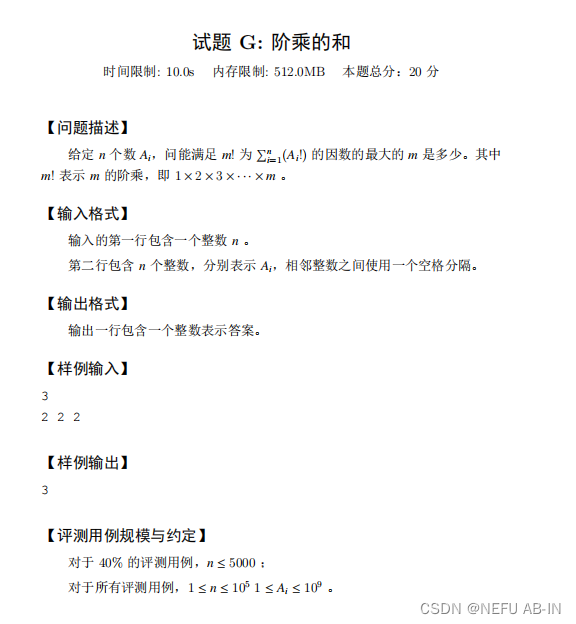
-
思路
还是暴力,思路就是可以把共因子都提出来,剩下的加和,从提出来的共同的因子的最大值开始,让加和除以它,直到不能除了,就是答案
其中,用哈希表记录用过的阶乘值,预处理一些阶乘值 -
代码
1
2
3
4
5
6
7
8
9
10
11
12
13
14
15
16
17
18
19
20
21
22
23
24
25
26
27
28
29
30
31
32
33
34
35
36
37
38
39
40
41
42
43
44
45
46
47
48
49
50
51
52
53
54
55# AB-IN AK Lanqiao !!
import sys, math
from collections import Counter, deque, defaultdict
from bisect import bisect_left, bisect_right
from heapq import heappop, heappush, heapify
from typing import *
from datetime import datetime, timedelta
N = int(1e5 + 10)
INF = int(2e9)
sys.setrecursionlimit(INF)
read = lambda : map(int, input().split())
class sa:
def __init__(self, x, y):
self.x = x
self.y = y
def __lt__(self, x):
pass
# ---------------divrsion line ----------------
# 暴力!
# 预处理1 ~ 5000阶乘
dd = Counter()
cnt = 1
for i in range(1, 5000):
cnt *= i
dd[i] = cnt
# ---------------------------------------------
a = [0] * N
n, = read()
a[1:] = list(read())
d = Counter()
base = min(a[1:])
ans = 0
for i in range(1, n + 1):
tmp = 1
if a[i] < 5000:
d[a[i]] = dd[a[i]] // dd[base]
elif d[a[i]] == 0:
for j in range(a[i], base, -1):
tmp *= j
d[a[i]] = tmp
ans += d[a[i]]
while True:
if ans == 1 or ans % (base + 1) != 0:
break
base += 1
ans //= base
print(base) -
试题 H: 奇怪的数

-
思路
还是暴力DFS
相当于搜满足条件的n位数,直接搜每一位即可,因为奇数位为奇数,偶数位为偶数
优化就是每次搜每一位的时候,和前面的四位数加和,判断是否小于等于m,如果不满足就直接不搜了 -
代码
1
2
3
4
5
6
7
8
9
10
11
12
13
14
15
16
17
18
19
20
21
22
23
24
25
26
27
28
29
30
31
32
33
34
35
36
37
38
39
40
41
42
43
44
45
46
47
48
49
50
51
52
53
54
55
56
57# AB-IN AK Lanqiao !!
import sys, math
from collections import Counter, deque, defaultdict
from bisect import bisect_left, bisect_right
from heapq import heappop, heappush, heapify
from typing import *
from datetime import datetime, timedelta
N = int(1e6 + 10)
INF = int(2e9)
MOD = 998244353
sys.setrecursionlimit(INF)
read = lambda : map(int, input().split())
class sa:
def __init__(self, x, y):
self.x = x
self.y = y
def __lt__(self, x):
pass
# ---------------divrsion line ----------------
# 感觉像数位dp,先打DFS暴力
# 想不出递推式 就优化暴力吧
n, m = read()
ji = ["1", "3", "5", "7", "9"]
ou = ["0", "2", "4", "6", "8"]
stji, stou = [0] * 5, [0] * 5
ans = 0
def dfs(s, d):
global ans
if d == n + 1:
ans = (ans + 1) % MOD
return
for i in range(5):
if d % 2 == 1:
cnt = int(ji[i])
for j in range(max(1, d - 4), d):
cnt += int(s[j])
if cnt <= m:
dfs(s + ji[i], d + 1)
if d % 2 == 0:
cnt = int(ou[i])
for j in range(max(1, d - 4), d):
cnt += int(s[j])
if cnt <= m:
dfs(s + ou[i], d + 1)
return
dfs(" ", 1)
print(ans % MOD)
-
-
试题 I: 子树的大小

-
试题 J: 反异或 01 串

-
思路
没时间想了,就特判了几种情况
-
代码
1
2
3
4
5
6
7
8
9
10
11
12
13
14
15
16
17
18
19
20
21
22
23
24
25
26
27
28
29
30
31
32
33
34
35
36
37# AB-IN AK Lanqiao !!
import sys, math
from collections import Counter, deque, defaultdict
from bisect import bisect_left, bisect_right
from heapq import heappop, heappush, heapify
from typing import *
from datetime import datetime, timedelta
N = int(1e6 + 10)
INF = int(2e9)
sys.setrecursionlimit(INF)
read = lambda : map(int, input().split())
class sa:
def __init__(self, x, y):
self.x = x
self.y = y
def __lt__(self, x):
pass
# ---------------divrsion line ----------------
# 骗分
def solve(s):
d = Counter(s)
if len(s) == d['0']:
return 0
if len(s) == d['1']:
return len(s) // 2
if s == "00111011":
return 3
return d['1']
s = input()
print(solve(s))
-
